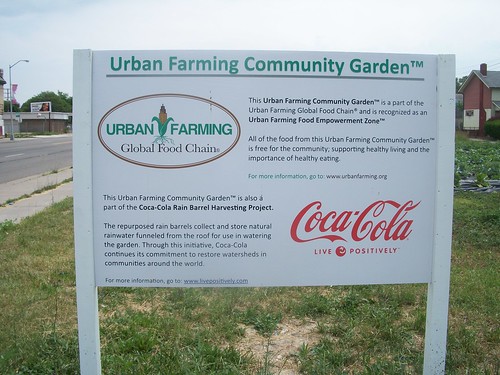
Illustrating the character of community gardening in one of Detroit's most devastated neighborhoods on Linwood at Gladstone. Coca-Cola is sponsoring this project but the billion dollar firm creates no jobs for the people. (Photo: Abayomi Azikiwe), a photo by Pan-African News Wire File Photos on Flickr.
Poor face obstacles in finding safe, healthy food in Detroit
January 19, 2012
By Robin Erb
Detroit Free Press Medical Writer
Decaying food, past-due expiration dates, dirty floors and grimy counters -- that's what awaits many Detroit residents who rely on corner stores and liquor establishments for much of their diet, according to a new study.
In a report based on inspections by volunteers at 207 Detroit food retail establishments -- mostly corner and party stores -- inspectors found expired foods in one in three stores.
A third had what was described as "moldy filth" on walls and on refrigerator racks.
Half had dirty floors. One in five was selling decaying produce.
The reviews were less formal than a state's food safety inspection and they carry no regulatory weight. Still, the findings are sobering.
In one place, "we found meat that was so old that it had turned brown and green," said Brandi Trapp, 28, a volunteer inspector and a barista at a Detroit coffee shop.
Each violation is another barrier to healthy food choices for poor people in Detroit, said Minsu Longiaru, executive director of the Detroit-based Restaurant Opportunities Center of Michigan (ROC-Michigan), one of the report's authors.
But the report also found that one in three businesses had no violations at all.
"This is a problem that has a solution," Longiaru said. "It doesn't have to be this way."
The report was triggered, in part, by concerns from ROC-Michigan, which represents about 800 low-wage food service workers. Many make minimum wage or less, Longiaru said: "One of the ironies of working as a low-wage employee of the food service industry is not having access to healthy, safe food."
The 207 businesses were drawn randomly from a list of more than 1,000 establishments in Detroit that both hold a liquor licenses and accept the state's Electronic Benefits Transfer (EBT), or food assistance, card. Information from the one-page inspection report -- developed by Metropolitan Organizing Strategy Enabling Strength (MOSES), a faith-based community activist organization -- was compared against U.S. census data.
About 100 volunteers, trained by MOSES, conducted the inspections in groups of two and three.
The stores with the highest number of violations correlated with the poorest neighborhoods and those with the highest number of children, a particularly vulnerable population. That's a one-two punch to families who have few choices and often must pay higher costs for lower-quality food, Longiaru said.
"It's kind of setting them up for poor nutrition and all the problems that go along with that," said Kurt Metzger, director of Data Driven Detroit, which collects data in southeast Michigan and analyzed the inspection reports.
Stores in neighborhoods with poverty rates of 45% or more averaged five food and sanitation violations, compared with 1.6 average violations in areas with a poverty rate of less than 15%.
The number of violations also increased in neighborhoods with a high number of minorities. Neighborhoods in which stores averaged 3.0 violations were largely populated by Caucasians. But in places where violations averaged 3.8 or 3.9, the residents were mostly Latino or African American.
Some of the survey data was based on subjective observation. For example, volunteers had to gauge whether a business was "poorly lit" or whether it "smells bad."
But the fact that volunteers deemed one-third of the businesses free of problems indicates their commitment to reliable information, Longiaru said.
Contact Robin Erb: 313-222-2708 or rerb@freepress.com
No comments:
Post a Comment